Driving into the rural town of Golega, we notice something pretty unusual. There are jeeps with cattle and horse trailers everywhere; parked on the small roundabouts, lined up in rows in stubble fields, packed into every available space. And then we see the horses.
They appear out of side alleys and gates; clip clopping in twos from the driveways of houses.
Laneways lead from areas of temporary stabling all over the town, and from these, the flow of horses and riders is ever towards the centre and the grand parade of animals and humans that is one of the most famous rural fairs in the world.
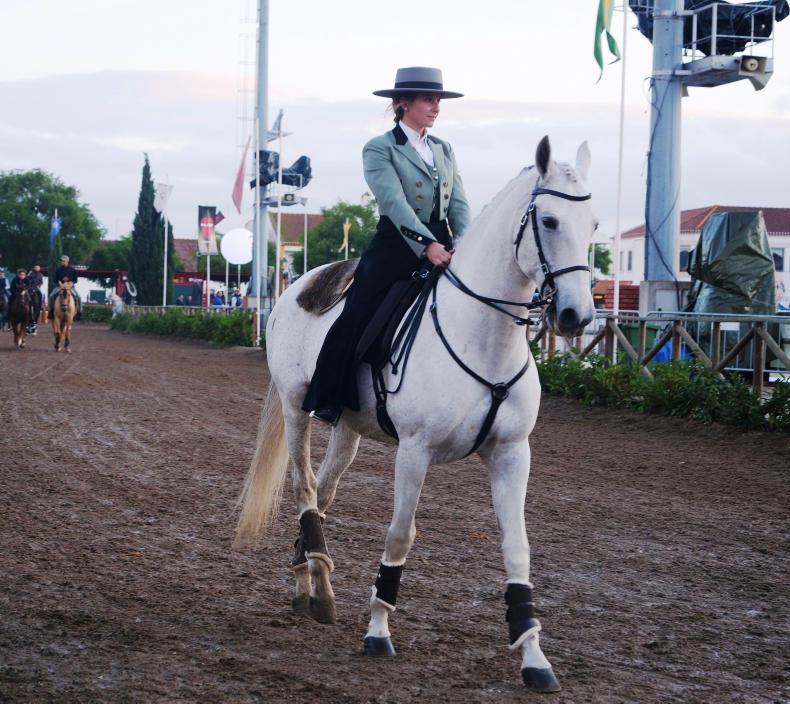
The fair at Golega.
I had read about Golega Fair for many years but had to pinch myself that I was actually there. Not only that, but I’d brought my two children and husband on one of those bucket-list things you think you will never do.
Our eyes were on stalks taking it all in; the colourful carriages pulled by mules, the prancing dressage horses, women riding side saddle nonchalantly with one hand.
Smoke from chestnut-roasting fires wafts across the central showground where the competitions take place, and it’s in the town’s central square where the real fun happens, and anyone can come and display their horse.
The wild west
The riders are beautifully dressed in traditional rural costume – tight trousers and short jackets for the men, wide skirts for the women, and the horses are immaculate.
On the edges of this parade area are the shops, bars, restaurants and food stalls that move to the town for the week long festival.
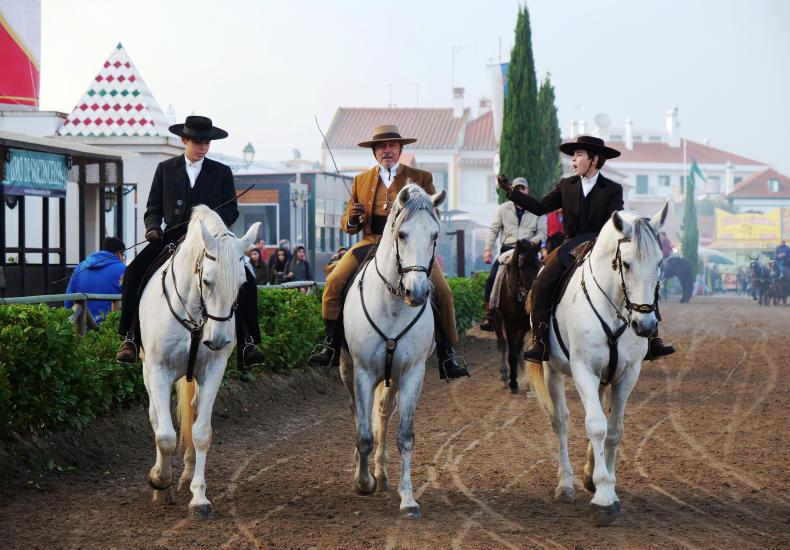
The fair at Golega.
Like the wild west, hitching rails are outside every bar but the horses stand quietly as glasses are clinked and news is exchanged.
There’s lots of craic and friendliness, we meet a lad we know from a farm we visited, he introduces us to his friends, soon we are all swapping stories and enjoying each other’s company. It’s basically Ballinasloe Fair only people are more dressed up.
Children and travel
Bringing our children to Portugal had not been a difficult decision, but bringing them away from the main tourist centres like Lisbon or the Algarve took a little more thought.
Up until recently, family holidays had been at a relative’s house in a Catalonian village of Cadaques. But we felt it was time to venture further afield.
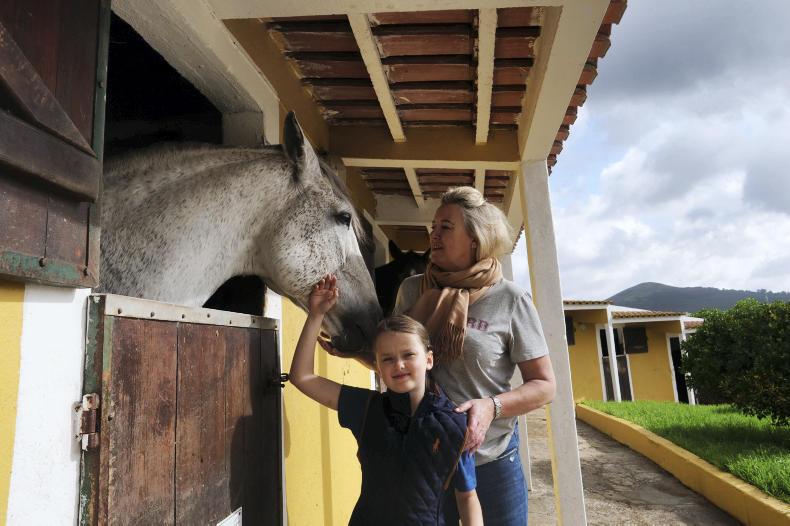
Suzanne with her daughter.
My husband Philip has reported from wars in Iraq, Lebanon and the Balkans. In our 20s, we lived in Asia, and travelled extensively there, as well as in Africa and India, clocking up risky situations and adventures wherever we went.
Once our children came onto the scene, these adventures ended. But did they have to? I have a dread of child-centred holidays, but how do you combine the needs of adventurous adults and small children safely?
Rural, not isolated
So rural Portugal came into our sights; visiting farms with a focus on their traditional Lusitano horses and exploring the local culture.
Arriving a day before my husband and family, I travelled to the first farm an hour and a half from Lisbon by public bus, using the metro from the airport to get to the bus station.
I speak no Portuguese but this was oddly the best experience possible. By the end of my journey I think I knew everyone on the bus.
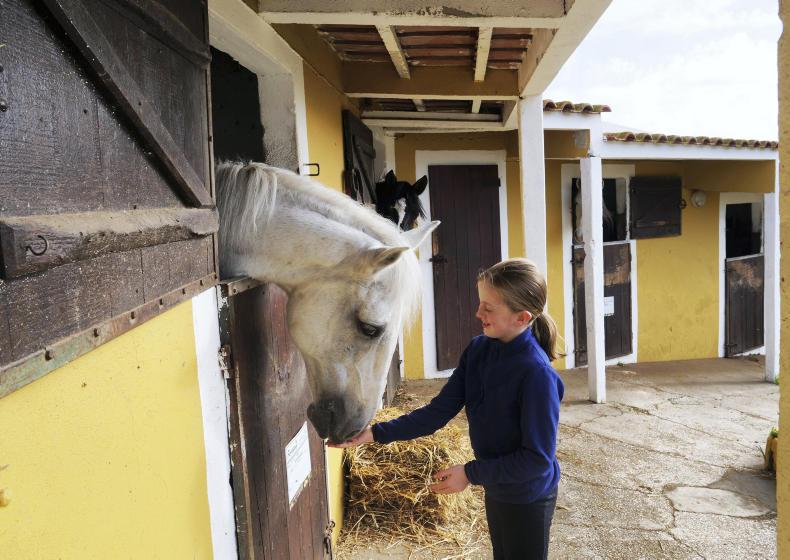
Suzanne's daughter with the horses.
The farm – Quinta do Rol – picked me up from the town and I was shown around the estate straight away which grows apples commercially and produces wine.
Horses were a hobby for them but teaching dressage to visitors has become a big business.
I moved into my gorgeous house renovated from the traditional farm buildings which also housed two Finnish riders and a Canadian couple.
It is a beautiful estate, with an indoor swimming pool, lovely food and incredible equestrian facilities.
Their horses gleam with condition, their bright eyes peeking through the traditional Lusitano long mane and slightly convex face.
The Lusitano is the horse we most see in movies or on television like Game of Thrones. Apart from their impressive heads and necks, the breed is very trainable and quiet.
Ironically, horses and the tourism that comes with them is now more important to many farms than food production
Originally bred for battle, Lusitano horses are now kept for showing and dressage, and like our Connemaras and Irish Draughts, the Portuguese are very proud of their national breed.
Ironically, horses and the tourism that comes with them is now more important to many farms than food production.
Rita Melo Ribeiro who owns Quinta do Rol, told me how their guests come from all over the world.
This was her family farm, and to make a success of a failing business she has undertaken huge investment in both the farming and tourist sides of the estate.
If you want a bit of luxury, riding and beautiful countryside, this is a stay that’s hard to beat and I was reluctant to leave.
Travelling back to Lisbon by bus I moved onwards to my next countryside stop – Alcainca ranch near the town of Mafra.
This was a more casual farm, centred around an old bull fighting ring which in much of rural Portugal is still an important social custom.
A turn up for the books
We had enormous fun here. With my husband and our girls (aged eight and 10) joining me, I thought at least the swimming pool would occupy them but as this trip was in late October the weather was a little too chilly to swim, so all three ended up riding dressage horses instead, which was a bit of a shock.
My husband likes a bit of hunting, but was convinced to get on board one of the Lusitanos, riding some very fancy moves.
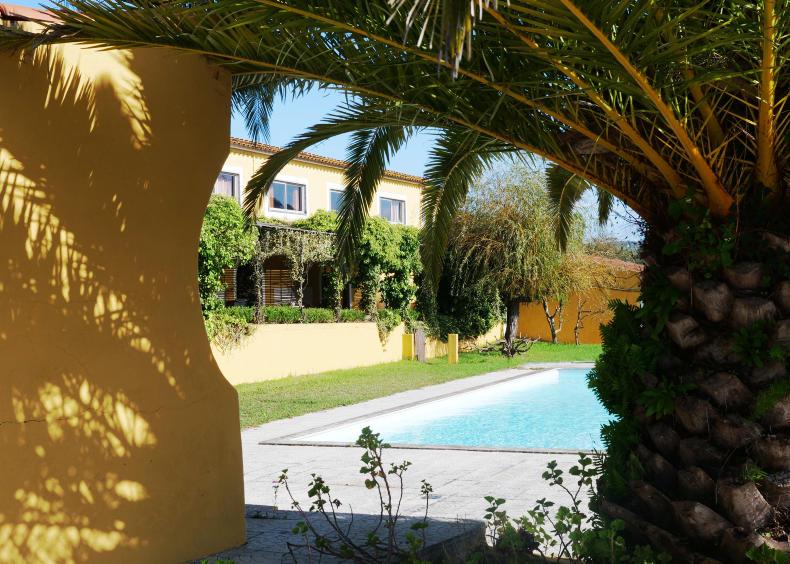
Travel rural Portugal.
By the end of the lesson Philip was converted, noting how in Portugal dressage is very much a masculine sport – and it is. We found it really unusual that mares are not really competed, they prefer to develop and train only the stallions.
I fell in love with a little grey stallion and my daughters both had lessons; looking like tiny dolls on the huge Lusitanos.
This was funny and slightly terrifying but as the farm’s instructor Paulo pointed out: “Here we do not have ponies, the children learn to ride the Lusitano horse, even the little babies!”
The joy of this place was hanging out with the locals, clients and teachers who shared breakfast lunch and dinner with us at the ranch.
We learned about life in rural Portugal where incomes are a fraction of here and where unemployment and depopulation is a big issue.
This also feels like a more sustainable type of tourism that brings money into small communities and farms.
And one that gives you that interaction with local people – sitting around the table sharing food and talking about how they make their farm or business work, which is hard to find in a normal tourist experience.
The famous Portuguese Atlantic coast is a short drive away from both of these ranches for beautiful days at the beach, fishing or eating in lovely seafood restaurants.
Let’s do it all again. The sooner the better
Heading back to Lisbon for a day we visited the famous Oceanarium with its sharks and sea otters – a big hit with the children, but the people and experiences we still talk about were had on the farms.
It’s rare all four of us have enjoyed a holiday so much and the verdict from both children and adults is: “Let’s do it all again. The sooner the better.”
Ryanair fly to Lisbon daily. Quinta do Rol and Alcainca Ranch are both offered by Irish-based Zara’s Planet holidays www.zarasplanet.com. Full board and accommodation including three lessons from €542pp for three nights. Non riders €89 per night.
Read more
Forty winks at Pontius Pilate’s place
Watch: Living on the wild side in Austria
Driving into the rural town of Golega, we notice something pretty unusual. There are jeeps with cattle and horse trailers everywhere; parked on the small roundabouts, lined up in rows in stubble fields, packed into every available space. And then we see the horses.
They appear out of side alleys and gates; clip clopping in twos from the driveways of houses.
Laneways lead from areas of temporary stabling all over the town, and from these, the flow of horses and riders is ever towards the centre and the grand parade of animals and humans that is one of the most famous rural fairs in the world.

The fair at Golega.
I had read about Golega Fair for many years but had to pinch myself that I was actually there. Not only that, but I’d brought my two children and husband on one of those bucket-list things you think you will never do.
Our eyes were on stalks taking it all in; the colourful carriages pulled by mules, the prancing dressage horses, women riding side saddle nonchalantly with one hand.
Smoke from chestnut-roasting fires wafts across the central showground where the competitions take place, and it’s in the town’s central square where the real fun happens, and anyone can come and display their horse.
The wild west
The riders are beautifully dressed in traditional rural costume – tight trousers and short jackets for the men, wide skirts for the women, and the horses are immaculate.
On the edges of this parade area are the shops, bars, restaurants and food stalls that move to the town for the week long festival.

The fair at Golega.
Like the wild west, hitching rails are outside every bar but the horses stand quietly as glasses are clinked and news is exchanged.
There’s lots of craic and friendliness, we meet a lad we know from a farm we visited, he introduces us to his friends, soon we are all swapping stories and enjoying each other’s company. It’s basically Ballinasloe Fair only people are more dressed up.
Children and travel
Bringing our children to Portugal had not been a difficult decision, but bringing them away from the main tourist centres like Lisbon or the Algarve took a little more thought.
Up until recently, family holidays had been at a relative’s house in a Catalonian village of Cadaques. But we felt it was time to venture further afield.

Suzanne with her daughter.
My husband Philip has reported from wars in Iraq, Lebanon and the Balkans. In our 20s, we lived in Asia, and travelled extensively there, as well as in Africa and India, clocking up risky situations and adventures wherever we went.
Once our children came onto the scene, these adventures ended. But did they have to? I have a dread of child-centred holidays, but how do you combine the needs of adventurous adults and small children safely?
Rural, not isolated
So rural Portugal came into our sights; visiting farms with a focus on their traditional Lusitano horses and exploring the local culture.
Arriving a day before my husband and family, I travelled to the first farm an hour and a half from Lisbon by public bus, using the metro from the airport to get to the bus station.
I speak no Portuguese but this was oddly the best experience possible. By the end of my journey I think I knew everyone on the bus.

Suzanne's daughter with the horses.
The farm – Quinta do Rol – picked me up from the town and I was shown around the estate straight away which grows apples commercially and produces wine.
Horses were a hobby for them but teaching dressage to visitors has become a big business.
I moved into my gorgeous house renovated from the traditional farm buildings which also housed two Finnish riders and a Canadian couple.
It is a beautiful estate, with an indoor swimming pool, lovely food and incredible equestrian facilities.
Their horses gleam with condition, their bright eyes peeking through the traditional Lusitano long mane and slightly convex face.
The Lusitano is the horse we most see in movies or on television like Game of Thrones. Apart from their impressive heads and necks, the breed is very trainable and quiet.
Ironically, horses and the tourism that comes with them is now more important to many farms than food production
Originally bred for battle, Lusitano horses are now kept for showing and dressage, and like our Connemaras and Irish Draughts, the Portuguese are very proud of their national breed.
Ironically, horses and the tourism that comes with them is now more important to many farms than food production.
Rita Melo Ribeiro who owns Quinta do Rol, told me how their guests come from all over the world.
This was her family farm, and to make a success of a failing business she has undertaken huge investment in both the farming and tourist sides of the estate.
If you want a bit of luxury, riding and beautiful countryside, this is a stay that’s hard to beat and I was reluctant to leave.
Travelling back to Lisbon by bus I moved onwards to my next countryside stop – Alcainca ranch near the town of Mafra.
This was a more casual farm, centred around an old bull fighting ring which in much of rural Portugal is still an important social custom.
A turn up for the books
We had enormous fun here. With my husband and our girls (aged eight and 10) joining me, I thought at least the swimming pool would occupy them but as this trip was in late October the weather was a little too chilly to swim, so all three ended up riding dressage horses instead, which was a bit of a shock.
My husband likes a bit of hunting, but was convinced to get on board one of the Lusitanos, riding some very fancy moves.

Travel rural Portugal.
By the end of the lesson Philip was converted, noting how in Portugal dressage is very much a masculine sport – and it is. We found it really unusual that mares are not really competed, they prefer to develop and train only the stallions.
I fell in love with a little grey stallion and my daughters both had lessons; looking like tiny dolls on the huge Lusitanos.
This was funny and slightly terrifying but as the farm’s instructor Paulo pointed out: “Here we do not have ponies, the children learn to ride the Lusitano horse, even the little babies!”
The joy of this place was hanging out with the locals, clients and teachers who shared breakfast lunch and dinner with us at the ranch.
We learned about life in rural Portugal where incomes are a fraction of here and where unemployment and depopulation is a big issue.
This also feels like a more sustainable type of tourism that brings money into small communities and farms.
And one that gives you that interaction with local people – sitting around the table sharing food and talking about how they make their farm or business work, which is hard to find in a normal tourist experience.
The famous Portuguese Atlantic coast is a short drive away from both of these ranches for beautiful days at the beach, fishing or eating in lovely seafood restaurants.
Let’s do it all again. The sooner the better
Heading back to Lisbon for a day we visited the famous Oceanarium with its sharks and sea otters – a big hit with the children, but the people and experiences we still talk about were had on the farms.
It’s rare all four of us have enjoyed a holiday so much and the verdict from both children and adults is: “Let’s do it all again. The sooner the better.”
Ryanair fly to Lisbon daily. Quinta do Rol and Alcainca Ranch are both offered by Irish-based Zara’s Planet holidays www.zarasplanet.com. Full board and accommodation including three lessons from €542pp for three nights. Non riders €89 per night.
Read more
Forty winks at Pontius Pilate’s place
Watch: Living on the wild side in Austria









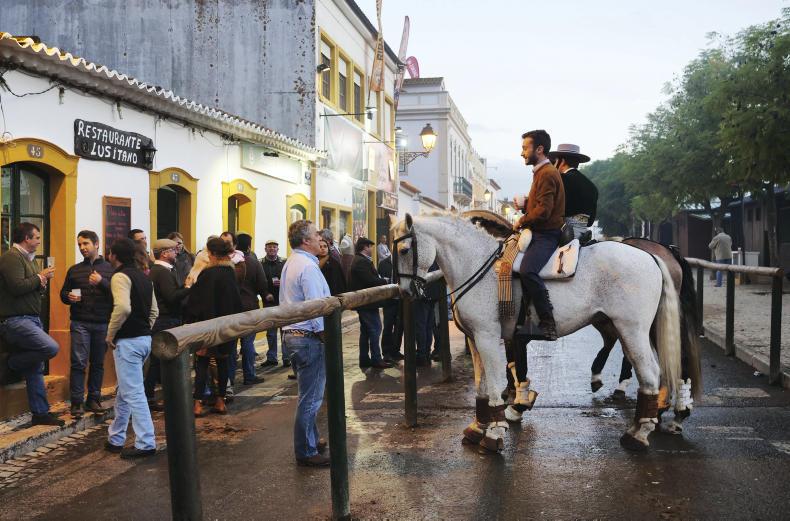



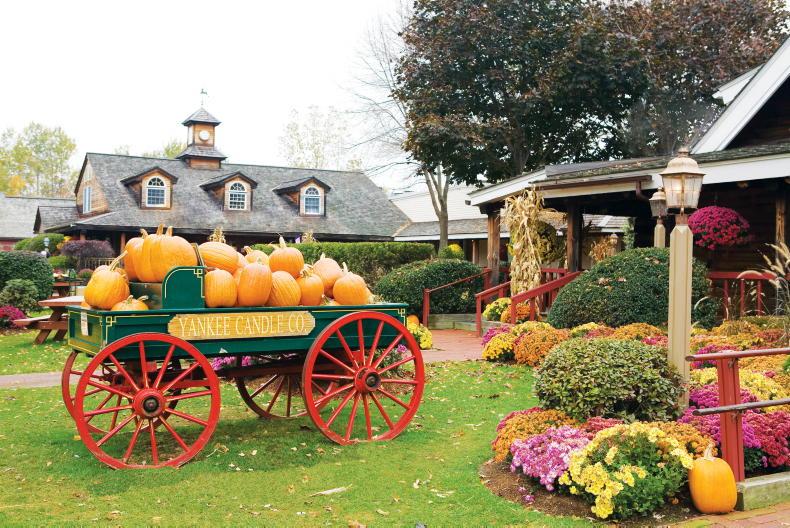
SHARING OPTIONS